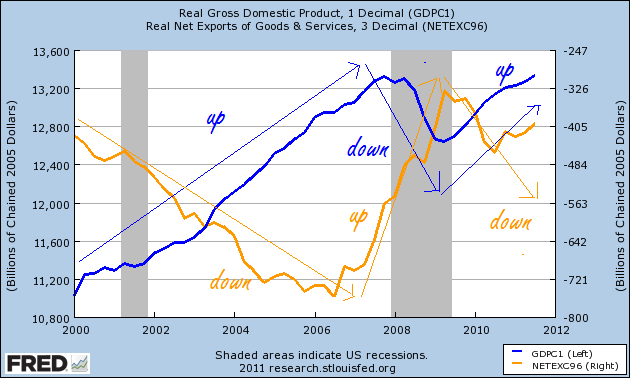Transferable Import Certificates Vs a Tariff policy.
Im a proponent of a trade policy based upon transferable Import Certificates, (ICs). (Refer to the discussion thread Warren Buffett's concept to (significantly) reduce USA's trade deficit,
begun at 5:57PM, July 27, 2009).
The IC policy proposal is often compared to tariff policies. Both policies would increase the prices paid by USA purchasers of imported goods. Both policies would not increase federal net spending or debt.
Unlike tariff rates that are set by the government, ICs open market global value is market driven. The federal assessment fees to defray governments expenses due to the IC trade policy are a nominal portion of and effectively set only ICs minimum global open market value.
The IC policy would absolutely eliminate the trade deficit of aggregate assessed values of goods subject to it REGARDLESS of imports additional prices to US purchasers; (i.e. even if prices for aggregate imported goods increased by only a penny per item, USAs trade deficit of those goods aggregate assessed values would be eliminated).
Elimination of aggregate assessed goods trade deficit subject to tariffs could only be assured if governments set tariff rates to the maximum global open market rate that ICs would possibly reach.
ICs would be are less likely than free trade or tariffs to be subjected mischief contrary to USAs economic interests. Such mischief is even perpetrated by our own government to our own economic disadvantage.
I particularly recall the U.S. government negotiating away the interests of Louisiana rice farmers because the USA wanted to retain naval bases in Okinawa. Under the IC trade proposal, government has no such policy discretion and the matter would be nonnegotiable.
The Marshall Plans expenses were paid for by all taxpayers. The expenses were not borne by particular industries or wage earners.
Tariffs would be an additional source of federal revenue. ICs are an additional revenue source for exporters of U.S. goods and would be an indirect but effective subsidy of USA exports.
Respectfully, Supposn
Im a proponent of a trade policy based upon transferable Import Certificates, (ICs). (Refer to the discussion thread Warren Buffett's concept to (significantly) reduce USA's trade deficit,
begun at 5:57PM, July 27, 2009).
The IC policy proposal is often compared to tariff policies. Both policies would increase the prices paid by USA purchasers of imported goods. Both policies would not increase federal net spending or debt.
Unlike tariff rates that are set by the government, ICs open market global value is market driven. The federal assessment fees to defray governments expenses due to the IC trade policy are a nominal portion of and effectively set only ICs minimum global open market value.
The IC policy would absolutely eliminate the trade deficit of aggregate assessed values of goods subject to it REGARDLESS of imports additional prices to US purchasers; (i.e. even if prices for aggregate imported goods increased by only a penny per item, USAs trade deficit of those goods aggregate assessed values would be eliminated).
Elimination of aggregate assessed goods trade deficit subject to tariffs could only be assured if governments set tariff rates to the maximum global open market rate that ICs would possibly reach.
ICs would be are less likely than free trade or tariffs to be subjected mischief contrary to USAs economic interests. Such mischief is even perpetrated by our own government to our own economic disadvantage.
I particularly recall the U.S. government negotiating away the interests of Louisiana rice farmers because the USA wanted to retain naval bases in Okinawa. Under the IC trade proposal, government has no such policy discretion and the matter would be nonnegotiable.
The Marshall Plans expenses were paid for by all taxpayers. The expenses were not borne by particular industries or wage earners.
Tariffs would be an additional source of federal revenue. ICs are an additional revenue source for exporters of U.S. goods and would be an indirect but effective subsidy of USA exports.
Respectfully, Supposn

